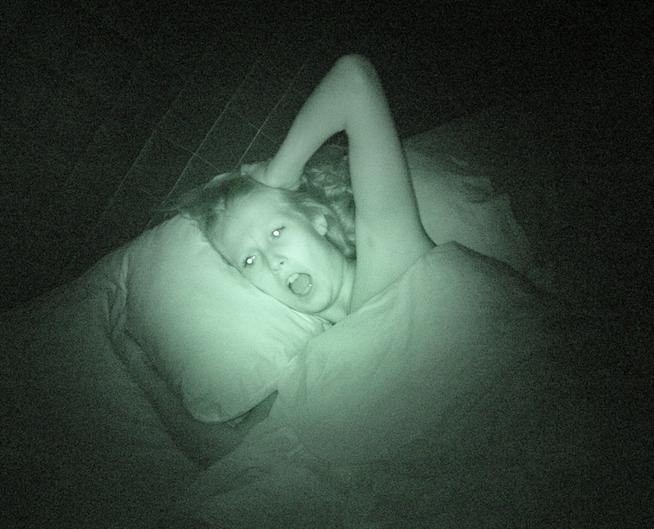
It has happened to so many people in such a consistent, freaky way that it is speculated by psychologists that sleep paralysis may be the source of the concepts of the night demons known as incubi and succubi.
I’d read the Bible. I knew demons were real, and I knew I had not been asleep.
I couldn't move.
A gentle breeze filtered through my bedroom window. Outside, I could hear low, hateful muttering, a dark and pebbly voice rising from the other side of the glass.
Someone was there.
Filled with dread, I wanted to get up and shut the window to keep him out, to shut out the voice, but my body was rigid and numb as if I had been drugged or tied up.
I was trapped inside my own body.
The presence oozed through my window and was inside my room, and it was so terrifying that my vision blurred. I felt and saw a shadow sweep across the floor, a thick black cloud obscuring the starlight.
Then I was choking. A crashing pressure fell on my chest, like I was being slowly crushed to death by a weight of rocks. Was the intruder sitting on my chest? Were his hands around my throat? Was he somehow inside my body?
My heartbeat skyrocketed, drumming through my body, flooding me with a throbbing awareness of panic, helplessness, and terror. He was mocking me, daring me to have my precious Jesus come save me if I really believed.
I felt terror and despair; my faith was too weak to save me. I was alone, and being tormented by a demon.
Or was I?
It sounds like a medieval horror story, but this really happened — to me, in California, 2002.
It has also happened to countless others from every culture and time in human history: sleep paralysis, a fairly common sleep disorder that has almost always been associated with supernatural horror.
You wake up in the middle of a REM cycle, but the cycle doesn’t stop. The Sleep Paralysis Project summarizes that “as well as the intrusion of waking brain activity in REM sleep, muscle paralysis (seen only in REM sleep) intrudes into wakefulness.” In short, you are mostly awake, and so you are aware and powerless as parts of REM continue: It is sleep’s suspension of voluntary body control and hallucination, plus consciousness. This means you can’t control your breath, or your body, or your mind.
I was a teenager when I first experienced sleep paralysis in my quiet, modern, middle-class American home, but I wouldn't have a name for it for another 10 years. You see, I was very religious, and for a long time assumed what I was experiencing was a demonic attack — a facet of what Evangelicals identify as spiritual warfare.
And to be fair, this was my own conclusion.
Because what else could it be? I’d read the Bible. I knew demons were real, and I knew I had not been asleep — and, to my dismay, I knew I hadn’t been able to overcome the devil with my faith.
So on top of being terrified, I was ashamed.
Instead of looking for a physical, mental, or emotional cause, it felt obvious me to assume there was some kind of supernatural explanation for it. And, again, to be fair, plenty of Evangelicals would probably have counseled me to look for a physical, mental, or emotional cause. Lots of Evangelicals would probably have told me I should see a doctor and look into sleep disorders.
But instead I went straight to my pastor believing I was being attacked by demons. And he and my Sunday school teacher prayed with me.
And I felt better… until it happened again.
They actually died in their sleep, probably because of sleep paralysis.
Turns out, the prayer probably didn’t solve my problem because I wasn’t being attacked by demons: I was experiencing two brain functions that are not meant to overlap but that occasionally do. The cluster of symptoms was terrifying enough to warrant a dramatic supernatural explanation; yet, it’s all completely traceable to neurobiology. Science isn’t sure why it happens, but the usual suspects — depression, anxiety, PTSD — are often blamed.
I didn’t even know sleep paralysis was until it happened to me. And no one around me knew about it either, so they couldn’t really help me figure it out.
In the 1980s, a bunch of Hmong immigrants to the US were so terrified of the episodes they were experiencing that author Shelley Adler speculates that sleep paralysis combined with their spiritual beliefs and life stressors literally scared them to death. They actually died in their sleep, probably because of sleep paralysis.
It happened to Henry Fuseli, we assume, because sleep paralysis is famously and beautifully depicted in his painting “The Nightmare” from 1781. It might have happened to witnesses in the Salem Witch trial, whose testimony matches sleep paralysis episodes and clearly terrified them enough to famously and terribly execute their neighbors. According to The Sleep Paralysis Project, sleep paralysis has been documented in medical writings as far back as 1662 CE, the 10th century CE, the second century CE, and even 400 BCE.
It has happened to so many people in such a consistent, freaky way that it is speculated by psychologists that sleep paralysis may be the source of the concepts of the night demons known as incubi and succubi, as well as all those super-detailed, specific stories of alien abductions.
People seem to have always lived with sleep paralysis, and to have always interpreted it through their local spiritual culture as an encounter with something dark and evil.
In her article “The Dark Side of the Placebo Effect: When Intense Belief Kills” for The Atlantic magazine, Alexis C. Madrigal gives us a thorough rundown of the around-the-world names for the wicked spirits people believed were behind sleep paralysis:
In Indonesia, it's called digeunton (‘pressed on’). In China, it's bei gui ya (‘held by a ghost’). The Hungarians know it as boszorkany-nyomas (‘witches' pressure’). In Newfoundland, the spirit that comes is called the Old Hag, and the experience of sleep paralysis, ag rog (‘hag-ridden'). The Dutch name comes closest to what English speakers know. They call the presence nachtmerrie — 'night-mare'.
That would have been comforting to know when I was young and scared and convinced I was personally facing the Old Hag — or Old Hob, as Christians used to call Satan.
It would have been comforting to know that my body was such a freaking wonderland that it could create its own rabbit hole.
I think it would have helped to hear an elder say: Hey kid, it’s a sleep disorder. You’ll survive and learn to know your body better. The morning will come.
There may be angels and demons, and science may not explain everything — but sometimes it does.
And if we talk about our bodies, emotions, and minds, and share these stories, some other angsty soul out there might hear and also realize that maybe there is an explanation for their struggles other than demonic attack.







